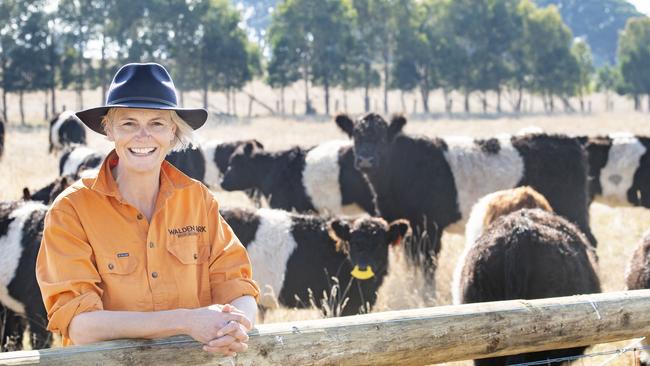The small scale farm with a big heart
The footprint of this Macedon Ranges’ beef operation might be small, but operator Donna Coutts has big dreams for both her farm and the land.
Walden Park at Spring Hill might be a small-scale operation by industry standards.
But founder Donna Coutts has large ambitions for how her Belted Galloway beef operation can be a success story for regenerative agricultural principles.
Walden Park in the Macedon Ranges is a small scale operation – only 47ha – running a single mob of 50 Belted Galloway cattle, along with a small mod of Border Leicester sheep.
It’s a simple operation in many ways, but one that’s working towards a broader objective: to educate both producers and consumers of the value of conscientious agriculture.
“We describe what we do as farming ecologically, or regeneratively, to organic principals although we’re not certified,” Ms Coutts said.
“It’s a low-input form of biological farming without synthetic applications. Labour is the significant input on the farm.”
Farming at Spring Hill since 2017, Ms Coutts and her partner Jason Shore took on the land which had previously been farmed conventionally as a grazing enterprise.
“The pastures were run down and there was bent grass and dandelions … we’d get a quick flush of annual growth in October to November and then nothing,” Ms Coutts said.
The cattle are used as the primary tool for pasture renovation, with the mob rotationally grazed and moved daily.

“I move the mob at least once, sometimes twice a day,” Ms Coutts said.
“We graze with a mob of about 50 cattle on a quarter of a hectare a day … depending on the season and what the cattle need, they’re on for a quick graze and a trample and then they’re off that ground. We maximise the plant recovery by taking them off straight away.”
Temporary solar fencing is used to section off paddocks, while cattle can access movable troughs which are plugged into irrigation lines around the farm.
Since establishing the farm back in 2017, Ms Coutts said the difference in soil health and biology can easily be seen.
“We can really see the health of the soil. The microbiological activity is going through the roof, water retention is better, and the plant population has really changed in that time,” Ms Coutts said.
“Our stocking limit and the stocking rate, there’s no way this farm could have supported a mob of cattle year-round. I think our stocking rate could increase a lot over the next few years, as the special mix moved from annual dominant to perennial. We do still support feed when it’s really cold but that is decreasing every year. The health of the soil and plant population is really improving.”
Even the choice of cattle breed – Belted Galloway – was done with the land and the consumer in mind.
“The beef is beautiful. It’s a slow-maturing heritage breed, and we never process under 24 months,” Ms Coutts said.
“They are medium-sized breed in terms of animal, and impact on the soil. Their temperament is lovely, and they suit being moved every day on foot, rather than with vehicles. They’re good mothers, and there’s an element of them helping with the storytelling. We’re on the road to Dalysford, and people notice the cattle and it starts a conversation.”
Walden Park sells boxed beef direct to consumers, processing one body a month at a local abattoir in Kyneton, before customers collect direct from the farm.
“We only process one body a month. That’s tiny in industry terms, we can’t feed the country but the way we think about it is even if we produce something like 2000kg of beef a year, that’s about 4000 meals, directly from me the farm to the consumer,” Ms Coutts said.
While the footprint of Walden Park may be small, Ms Coutts has big dreams when it comes to consumer connection and broader education about the sector.
“We’re tiny in industry terms,” Ms Coutts said.
“We’re in a peri-urban location, and can be a highly-visible farm. We can use the power of story telling to tell people about different farming methods, landscape health, and also to build an engaged community of informed people who value farming and understand farming, and value food.”
She said the reception has been “fantastic”, with both visitors to the farm and customers interested in how the enterprise operated.
“Food is the connection between us, and also the key.”
Originally hailing from a family Merino wool operation, Ms Coutts spent time working as a journalist before returning to farming.
“When you’ve had some time away from farming, it gives you an opportunity for a fresh perspective on things you’d like try, and that time away allowed me to look at things from a different angle, and to be brave to try new things on the farm.”
“I’m interested in how I can play a part in helping larger land owners understand that this is scalable.”





